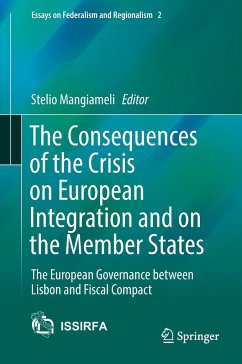
The EU after Lisbon
Amending or Coping with the Existing Treaties?
Herausgegeben: Rossi, Lucia Serena; Casolari, Federico
Versandkostenfrei!
Versandfertig in 6-10 Tagen
76,99 €
inkl. MwSt.

PAYBACK Punkte
38 °P sammeln!
The book contains a collection of high-quality academic and expert contributions dealing with the central question of whether the Lisbon Treaty needs further revision. Due to the difficulties European Union actors have encountered in implementing the Lisbon Treaty's reform and the inadequacies of the current legal framework brought to light by post-Lisbon practice, the volume focuses on possible innovations and functional approaches to improve the Union's response to the challenges confronting it.In doing so, the volume first takes a horizontal approach to the Treaty' revision and considers so...
The book contains a collection of high-quality academic and expert contributions dealing with the central question of whether the Lisbon Treaty needs further revision. Due to the difficulties European Union actors have encountered in implementing the Lisbon Treaty's reform and the inadequacies of the current legal framework brought to light by post-Lisbon practice, the volume focuses on possible innovations and functional approaches to improve the Union's response to the challenges confronting it.
In doing so, the volume first takes a horizontal approach to the Treaty' revision and considers some constitutional features showing the interaction between the EU and its Member States (namely, the parameters of constitutional developments, the allocation of competences, the principles of solidarity and loyal cooperation). Then, the focus shifts to the question of fundamental rights within the EU's constitutional framework, one of the most relevant innovations of the Lisbon Treaty being the incorporation of the Charter of Fundamental Rights into the Union's primary law. The last part of the volume is devoted to another domain significantly reshaped by the Lisbon reform, namely, the Union's external dimension. ECJ Advocate General Paolo Mengozzi's conclusions highlight the common themes emerging from the various contributions, stressing the need for a more general supranational approach to the political crisis the Union is going through.
The content of this book will be of great value to academics, students, judges, practitioners and all others interested in the legal discourse on the progressive development of the European Union legal order.
In doing so, the volume first takes a horizontal approach to the Treaty' revision and considers some constitutional features showing the interaction between the EU and its Member States (namely, the parameters of constitutional developments, the allocation of competences, the principles of solidarity and loyal cooperation). Then, the focus shifts to the question of fundamental rights within the EU's constitutional framework, one of the most relevant innovations of the Lisbon Treaty being the incorporation of the Charter of Fundamental Rights into the Union's primary law. The last part of the volume is devoted to another domain significantly reshaped by the Lisbon reform, namely, the Union's external dimension. ECJ Advocate General Paolo Mengozzi's conclusions highlight the common themes emerging from the various contributions, stressing the need for a more general supranational approach to the political crisis the Union is going through.
The content of this book will be of great value to academics, students, judges, practitioners and all others interested in the legal discourse on the progressive development of the European Union legal order.












